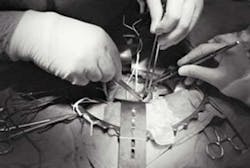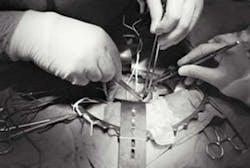... With a little help from my friends
Through an organ donation, this Minnesota hygienist gives an extraordinary gift to a friend.
by Cathleen Terhune Alty, RDH
Many of us are familiar with organ donations. The media is full of stories of people who have donated corneas, hearts, and other vital organs upon their death. But stories about donating an organ while still alive are not as widely known.
If you were given the chance to greatly improve the quality of someone's life, or even save someone's life, would you do it? At what cost to yourself? Would you lay down your life for a family member? A friend? A stranger?
These are difficult questions that are even more difficult to answer. In April 2001, Kris Anderson, RDH, of Coon Rapids, Minn., became a living organ donor for a friend who desperately needed a kidney. This is her story.
We met the Swokowski family through the swim club where our daughter, Rachel, is a member. Kelsey Swokowski and Rachel are the same age. While watching Rachel at meets and practices, we became friends with the entire Swokowski family. As we became acquainted, we discovered we had many things in common besides swimming, including the fact that both Mike (my husband) and Jay (Kelsey's dad) are diabetic. Over the past four or five years, Mike and Jay have exchanged experiences in dealing with diabetes. For the last two years, Jay has had many serious complications as a result of his diabetes.
While at the University of Minnesota hospital and clinics, Jay received some shocking news. He was told that he would need a kidney transplant due to kidney failure. Until that time, Jay had never been told that he had any kidney problems. Over the next six months, his health declined. It became obvious that the experts were correct in their diagnosis. The Swokowski family began to prepare mentally and emotionally for a transplant. They began the necessary testing and were added to the national organ donation list.
In January 2001, I learned from Jay's wife, Julie, the seriousness of Jay's health problems. She explained that Jay was going to be put on a waiting list to receive a kidney from a cadaver. Julie had hoped to be a living donor, but she has the wrong blood type. She also said that Jay's other family members either have the wrong blood type or health problems that make them unsuitable donors. I told Julie that I have Type O blood, and found out that Jay has the same type. I asked if it was possible to be tested to see if I could be a potential donor. Julie was shocked that I would even consider becoming a donor. After inquiring two separate times, Julie finally gave me the phone number of their transplant coordinator at the University of Minnesota. I set up an appointment the following week to have a blood sample drawn for the initial match to see if Jay had any antigens to my blood.
Before my initial appointment, I received a large envelope containing all kinds of information about becoming a kidney donor, including a study that followed living donors since the 1960s. Some of the information was kind of scary! There was much I hadn't thought about up to that point. The more material I read, the more I became convinced that this was the right thing to do, so I went ahead with the blood test. A few days later, I found out that I was a suitable donor because there were no problems with antigens. Now, I had a decision to make. It was very important to me to know my daughter's and my husband's true feelings about my becoming a donor. Several nights during dinner, I asked for their input. I wanted to know what they thought and if they were worried or had any reservations or concerns. We discussed the realities of surgery, the need for time off from work for recovery, limitations of activities during recovery, how this would impact us financially, and just about every other aspect we could think of. Rachel and Mike had concerns about the pain I would go through, but both thought it would be the most wonderful gift anyone could give – the gift of life.
The next thing I needed to do was talk to my parents, in-laws, siblings, and employer. I spoke in general terms since I didn't know if I'd pass the physical exam. They all offered a wide range of comments; one wondered if it was too late for me to back out, but most were very supportive. With my family's blessing, I scheduled an appointment for the required testing to determine whether or not I could become Jay's kidney donor.
Mike went with me to the University of Minnesota for the first day of testing. We had an opportunity to talk with a transplant surgeon and ask as many questions as we wanted. He explained the general risks of surgery, the option of having the kidney harvested laparoscopically (how do they get a kidney out of such a small incision?), the kind of pain involved, recovery time following the surgery, and how the donation would impact my overall health.
I completed some medical tests that day that I had never had before. Each health-care worker I met thanked me for considering organ donation to help a friend. It was reassuring to learn of the numbers of live kidney donations that are done at the university each year. At each testing site, I saw other people holding onto the same blue folder full of papers, each of them there for the same reason.
A couple of weeks later, I received word that the panel of surgeons had deemed me in perfect health to proceed with the kidney donation. When we called the Swokowski family with the news, they were thrilled, excited, thankful, and nervous about the upcoming surgery. For the next five weeks, it was critical that Jay and I both remain healthy. Our families avoided contact with anyone having an illness. A few days before the surgery, Julie, Jay, Mike, and I went out for dinner. We spent the whole evening talking, suddenly realizing how late it was when we noticed we were the only people left in the restaurant. Julie and Jay were thankful and appreciative of my willingness to donate. Jay still couldn't believe that anyone would do that for him.
I can't fully explain all of the feelings I experienced as a kidney donor. I believe I had been given a wonderful opportunity to help improve the quality of Jay's life. In a sense, I gave Jay the gift of life. Short of giving birth to my daughter, I'd never had a similar opportunity. What a powerful thing to be able to do; I am so thankful that I had the opportunity. Becoming Jay's donor has brought our two families together in a way we never expected. Jay's children say we are now related!
Jay has not had any problems with his new kidney. He says the transplant was a piece of cake! Seven weeks after the kidney surgery, Jay underwent a successful pancreas transplant. He is doing well now and is no longer a diabetic. He's thankful for both surgeries and for his restored health. Jay, Julie, Mike, and I have become incredibly close friends. I know that no matter what happens in our lives, we will always remain close.
Looking back on the process of deciding to become a kidney donor, I can say with all honesty that I have no regrets. Yes, there was some pain and discomfort involved, but I gained so much personally from this experience. I would never hesitate to help a friend or family member in this way. In reality, donating a kidney was an easy thing to do. I feel wonderful both physically and emotionally. I don't think donating is an extraordinary thing to do, but it is an extraordinary gift to give. All along, I have said this was not about me. This was about helping a friend. My hope is that through my experience I can encourage others to consider organ donation. I am honored to have been part of Jay's return to health.
In reality, donating a kidney was an easy thing to do. I feel wonderful both physically and emotionally. I don't think donating is an extraordinary thing to do, but it is an extraordinary gift to give. All along, I have said this was not about me. This was about helping a friend. My hope is that through my experience I can encourage others to consider organ donation.

